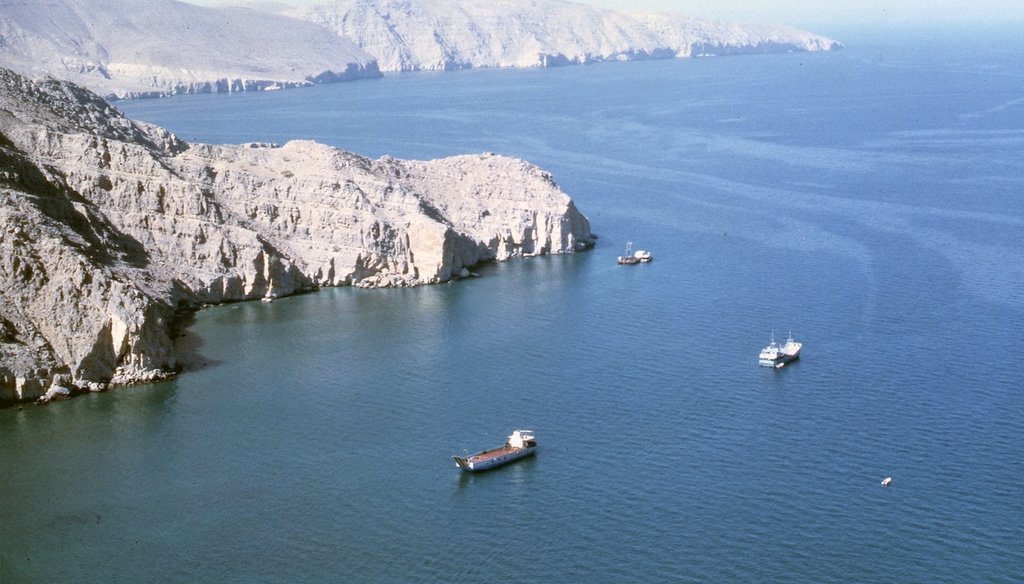Stand up for the facts!
Our only agenda is to publish the truth so you can be an informed participant in democracy.
We need your help.
I would like to contribute

This file photo from around 1980 shows the Strait of Hormuz, a crucial sea link between the Persian Gulf oil-exporting nations and shipping lanes to oil-importing nations. (AP)
If Your Time is short
-
A narrow passage of water called the Strait of Hormuz is the primary route for Middle Eastern countries shipping oil and petroleum products from the Persian Gulf to the rest of the world.
-
Iran has threatened before to close the waterway, but it has never done so.
-
The Strait of Hormuz’s closure could increase the price of oil beyond $100 a barrel globally, triggering an increase in average gas prices in the U.S. according to news reports.
Following the United States’ bombing of three Iranian nuclear facilities on June 21, the Iranian parliament approved a potential closure of the Strait of Hormuz, a crucial oil shipping route.
The decision is not set in stone — Iran’s Supreme National Security Council and Supreme Leader Ali Khamenei have the final power to close the strait.
Closing the waterway — which the U.S. Energy Information Administration described as a "critical oil chokepoint" — would be costly for Iran. It would also have widespread impacts on the global energy market.
Iran has previously threatened to close the strait during other conflicts, but has never followed through.
Some social media users — especially those critical of the Trump administration’s decision to strike Iran — expressed concern about the ramifications on oil and gas prices should Iran block the strait.
Here’s what to know.
What is the Strait of Hormuz and why does it matter?
The Strait of Hormuz is a narrow passage of water that connects the Persian Gulf and the Gulf of Oman. It is 21 miles wide at its narrowest point with a two-mile wide shipping lane in either direction.
It is the primary route Middle Eastern countries use to ship crude oil and petroleum products from the Persian Gulf to the rest of the world.
In the first half of 2025, the United States Energy Information Administration reported that about 20% of the world’s total volume of crude oil, condensate, and petroleum products moved through the strait.
Crude oil and condensates are natural hydrocarbons of varying density and composition that make up large parts of the production of gasoline. Petroleum products are the results of the processing of crude oil and condensates.
What would it mean for Iran to close the Strait of Hormuz?
It’s never happened before, so it’s unclear exactly what a closure of the Strait of Hormuz might look like. Iran would have to use force or threat of force to close the waterway, because it holds no legal authority to do so. International maritime law says innocent passage can’t be impeded.
Iran could attempt to lay mines across the shipping lanes that would explode if passing traffic were detected, news reports said. In the past, Iranian military or paramilitary forces have tried to strike or seize vessels in the strait.
The Washington Post cited analysts who said that if Iran chose to close the strait, oil prices could grow past $100 per barrel, which could increase the average price of gasoline in the United States to $4 per gallon, around a 24% rise from the current national average price. ABC News also reported that financial services firm Lazard told investors in a memo that global oil prices could rise to as much as $120 per barrel, which Fox Business calculated would lead to a $1.25 increase in U.S. gasoline prices.
But the move would come at a steep price for Iran — and countries that rely heavily on Iran’s oil exports, such as China.
The Energy Information Administration estimated that in 2024, about 84% of the condensate and crude oil that moved through the Strait of Hormuz went to Asia.
Sixty-nine percent of the crude oil that moved through the Strait of Hormuz went to China, India, Japan and South Korea. Strait of Hormuz supply disruptions would likely impact those countries’ energy markets most, the Energy Information Administration said.
The strait’s closure would also significantly impact Middle Eastern countries. Saudi Arabia, the second-highest producer of oil globally, exported 40% of the barrels of oil that passed through the strait. Qatar, United Arab Emirates, Kuwait and Iraq also export the majority of their oil through the strait and would face economic setbacks if access to the waterway became restricted.
Comparatively, the Energy Information Administration reported that oil passed through the Strait of Hormuz constituted about 7% of United States crude oil and 2% of U.S. petroleum liquids. The United States has led crude oil production globally for the past six years.
"It will have some impact on us. It will have a lot more impact on the rest of the world, a lot more impact on the rest of the world," U.S. Secretary of State Marco Rubio said on CBS’ Face the Nation on June 22. "That would be a suicidal move on their part because I think the, the whole world would come against them if they did that."
Rubio also encouraged China, which purchases almost 90% of Iran’s oil exports, to pressure Iran into keeping the strait open. On June 23, Beijing criticized the U.S.’ actions in Iran, but the government has yet to publicly comment on the strait.
Skip York, a nonresident fellow in energy and global oil in the Center for Energy Studies at Rice University’s Baker Institute, said that a closure of the strait would remove "a significant portion of global oil supply from the market," driving up prices based on how long market forces anticipate the closure would last.
"Although the rise in prices would be felt globally, the initial economies impacted would be in Asia," York said. "The longer the duration of the closure, the greater the impact of rising oil and gas prices would have increasing input costs, accelerate inflation, and potentially slow economic growth."
If the Strait of Hormuz is closed, what happens next?
Middle Eastern nations in the past formulated alternative routes to the strait, but those alternative routes don’t match the strait’s capacity.
For example, Saudi Arabia’s national oil company operates a pipeline that runs from near the Persian Gulf to a port on the Red Sea. Although the pipeline has a capacity of around 5 million barrels a day, the Energy Information Administration said the pipeline alternatives in the region do not typically operate at full capacity.
Saudi Arabia and the United Arab Emirates have built infrastructure that can handle 2.6 million barrels of oil daily, a small number compared to the about 20 million barrels that pass through the Strait of Hormuz daily, the agency said.
When Iran targeted ships in the Strait of Hormuz in the 1980s, the U.S. Navy escorted ships through the strait.
This June, even without a formal closure, some oil tankers and supertankers — which can carry 2 million barrels of oil — began avoiding the Strait of Hormuz after the U.S. strikes on Iran, Reuters and CNBC reported.
RELATED: Did Trump violate War Powers Act by bombing Iran nuclear sites?
RELATED: Ask PolitiFact: Was Iran ‘weeks away’ from having a nuclear weapon, as Trump said?
RELATED: Are Iranian nuclear sites ‘obliterated,’ as Donald Trump said? Too soon to know, experts say
Our Sources
Email interview with Skip York, a nonresident fellow in energy and global oil in the Center for Energy Studies at Rice University’s Baker Institute, June 23, 2025
Enverus, What Exactly is Condensate in Oil & Gas?, 2020
The United States Energy Information Administration, Oil and petroleum products explained, June 12, 2023
Reuters, US leads global oil production for sixth straight year- EIA, March 11, 2024
The United States Energy Information Administration, What countries are the top producers and consumers of oil?, April 11, 2024
The United States Energy Information Administration, Amid regional conflict, the Strait of Hormuz remains critical oil chokepoint, June 16, 2025
ABC News, Israel-Iran conflict expected to hike US gas prices, experts say. Here's how much, June 18, 2025
Axios, Iran parliament reportedly backs closing Strait of Hormuz, which could spike oil prices, June 22, 2025
CNBC, Iran’s parliament backs blocking Strait of Hormuz. Its closure would alienate Tehran further, June 23, 2025
CNN, What is the Strait of Hormuz and why is it so significant? June 23, 2025
CBS News, World Strait of Hormuz could be vulnerable to Iran retaliation. Here's what to know about the vital oil trade route, June 23, 2025
BBC, Strait of Hormuz: What happens if Iran shuts global oil corridor? June 23, 2025
Al Jazeera, Can Iran really shut down the Strait of Hormuz? June 23, 2025
Reuters, Iran's top security body to decide on Hormuz closure, Press TV reports, June 22, 2025
The Guardian, The strait of Hormuz: how could Iran close it and why does it matter to global trade? June 23, 2025
Fox Business’ YouTube channel, ‘ECONOMIC SUICIDE’: Rubio warns Iran is on the verge of making ‘another terrible mistake’ #shorts, June 23, 2025
The Dallas Morning News, What is the Strait of Hormuz and why it matters if Iran tries to block it? June 23, 2025
The Washington Post, Iran eyes closure of Strait of Hormuz, a crucial choke point for the world’s oil supply, June 23, 2025
Bloomberg, What If Iran Tries to Close the Strait of Hormuz? June 22, 2025
Reuters, Tankers U-turn, zig-zag, pause around Strait of Hormuz, June 23, 2025
CBS News, Strait of Hormuz could be vulnerable to Iran retaliation. Here's what to know about the vital oil trade route, June 23, 2025
CBS, What does the widening military conflict in Iran mean for oil prices? Here's what the experts say, June 23, 2025
BBC, US asks China to stop Iran from closing Strait of Hormuz, June 23, 2025
The University of Texas at Austin’s Strauss Center for International Security and Law, Strait of Hormuz – Tanker War, accessed June 23, 2025
The University of Texas at Austin’s Strauss Center for International Security and Law, Strait of Hormuz – Iran and Oil, accessed June 23, 2025
Fortune, The Strait of Hormuz is a critical chokepoint for global energy markets, but there are ways to get around it, June 23, 2025
Fox Business, How US strikes on Iranian nuclear facilities could affect gas prices, June 23, 2025
CBS News, What does the widening military conflict in Iran mean for oil prices? Here's what the experts say, June 23, 2025
CNBC, Tankers showing caution around Strait of Hormuz after U.S. attack on Iran nuclear sites, June 23, 2025
The Maritime Executive, Maritime Security: The Concept of Innocent Passage, Dec. 17, 2014
United Nations, PART III STRAITS USED FOR INTERNATIONAL NAVIGATION, accessed June 23, 2025
BlueDream’s X post, June 22, 2025
Brian Krassenstein’s X post, June 22, 2025





































